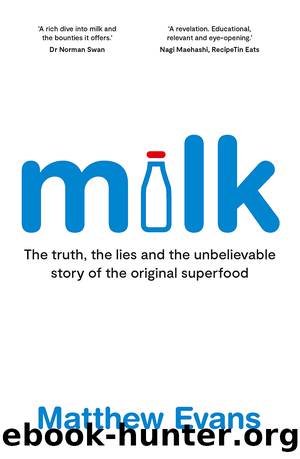Milk by Matthew Evans

Author:Matthew Evans [Matthew Evans]
Language: eng
Format: epub
Publisher: Allen & Unwin
Published: 2024-05-21T00:00:00+00:00
If plant-based âmilksâ are trying to mimic real milk, they could find it hard going â partly because we donât yet really know what milk is, let alone exactly whatâs in it. Itâs hard to replicate when you donât know what youâre replicating. And so far, while some plant juices might perform closer to milk in your cappuccino â far closer than pigeon milk, I imagine â those plant milks are generally bereft of real milkâs macronutrients, let alone its micronutrients.
Thereâs other work being done, scary work, to see if we can alter the milk an actual animal gives. In China, cows have had human mammary gland genetics inserted into them, so their milk is â80 percent the same as human breastmilkâ, according to the researcher involved. The 300 cloned cattle on the researcherâs farm near Beijing, according to reports from 2011, âcould provide the same nutritional properties as human breastmilk, but with a taste even stronger and sweeterâ.2
Thereâs also a move to make milk that is nutrient dense, particularly higher in protein â without even using a cow, or a pigeon, but still using genetic modification.
This technology uses genetically modified yeasts, the kind being harnessed to provide proteins to put in fake meats. Itâs been dubbed âprecision fermentationâ by proponents, who point out that itâs the same basic process â fermentation â that is used to turn soybeans into soy sauce, and barley into beer. The âprecisionâ bit is marketing spin, and clever it is, too. Itâs also called ârecombinant protein expressionâ or âmicrobial fermentationâ or âcell factoriesâ, depending on who you talk to.
In Australia, our pre-eminent scientific organisation, the CSIRO, does a lot of cutting-edge research, these days often in partnership with private companies. One such partnership is with start-up company Eden Brew. Theyâre inserting into yeasts the genes that make cow milk proteins, to ferment a milk substitute. As they explain:
Natureâs method is perfect ⦠but it didnât count on having 10 billion mouths to feed. So weâve stepped in. We map cow milk genes to produce dairy proteins that deliver cow milk nutrition and sensory experience.
Download
This site does not store any files on its server. We only index and link to content provided by other sites. Please contact the content providers to delete copyright contents if any and email us, we'll remove relevant links or contents immediately.
Craft Beer for the Homebrewer by Michael Agnew(18245)
Marijuana Grower's Handbook by Ed Rosenthal(3682)
Barkskins by Annie Proulx(3371)
Project Animal Farm: An Accidental Journey into the Secret World of Farming and the Truth About Our Food by Sonia Faruqi(3221)
The Plant Messiah by Carlos Magdalena(2934)
Red Famine: Stalin's War on Ukraine by Anne Applebaum(2933)
0041152001443424520 .pdf by Unknown(2845)
Organic Mushroom Farming and Mycoremediation by Tradd Cotter(2691)
In the Woods by Tana French(2598)
Beer is proof God loves us by Charles W. Bamforth(2461)
7-14 Days by Noah Waters(2419)
Between Two Fires by Christopher Buehlman(2359)
Borders by unknow(2313)
Reservoir 13 by Jon McGregor(2302)
Meathooked by Marta Zaraska(2260)
The Art of Making Gelato by Morgan Morano(2255)
Birds, Beasts and Relatives by Gerald Durrell(2228)
The 7 Habits of Highly Effective People: Powerful Lessons in Personal Change (25th Anniversary Edition) by Covey Stephen R(2205)
The Lean Farm Guide to Growing Vegetables: More In-Depth Lean Techniques for Efficient Organic Production by Ben Hartman(2136)
